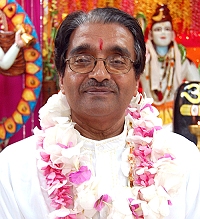From a satsang with Paramacharya of SWAHA, H.H. Pt. Hardeo Persad
The auspicious month of Shraavan, the fifth month of the Hindu calendar, begins on July 14 until August 11, 2022. Each day during this month is considered especially auspicious for worshipping Shivaji, thus, devotees increase their devotions to gain divine blessings and spiritual advancement.
From a mythological perspective, it is said that Parvati Maa performed penance for the entire month of Shraavan in order to win Lord Shiva’s hand in marriage and be his consort. Lord Shiva was pleased with her dedication and devotion and fulfilled her wish. This can be interpreted to mean that through sincere and constant devotion of Lord Shiva, the devotee can eventually identify with the Supreme Being. Thus, the individual soul rediscovers that is the same as the eternal divinity.
It is also said that it was during the month of Shraavan that Shivaji saved the universe from destruction by the deadly poison that emerged when the Devtas and Raakshasas churned the ocean. Similarly, Lord Shiva destroys the poisons in His devotees’ lives in the form of negativity, and through the blessing of detachment from the aversions and attractions of worldly activities. Shiva means ‘auspiciousness’ and ‘goodness’. He also symbolizes the state of dispassion, vairaagya. It is one of the four necessary qualifications for freedom from the bondage of the cycle of birth and death.
The deadliest poison is that of materialism, which consumes humans, causing conflict and discord in the world. Yet, at the end of life, we cannot take it with us beyond death. When we worship Shivaji conscientiously, we develop the power of spiritual dispassion, which consumes materialism. We can only reach that state of spiritual perfection, peace and ecstasy if we develop the power of tyaaga (renunciation) through our spiritual practices. Thus, we transcend the oscillations of pain and pleasure, happiness and sadness, life and death. Shivaji exists in each of us in the form of vairaagya and tyaaga. When we worship Him, the intent is to discover that power within us. Our scriptures state, “Yatha Pinde, Tatha Brahmande”: “As it is in the microcosm, so it is in the macrocosm.” The spiritual journey is always within.
Bhagavan Shankar stays in meditation for thousands of years, while controlling the five major praan vaayu (vital airs), as well as the five minor ones. Together, the praan vaayu control all the bodily metabolic activities. Lord Shiva harnesses and restrains all these bodily functions, symbolized by his tied matted locks, so that he can meditate, undisturbed by bodily requirements. He represents self-restraint and self-discipline in all its forms. He is the master of his body.
From His matted locks, flows the Ganga River, which symbolizes the stream of devotion. Thus, self-restraint or control of the senses leads to depth of worship, and devotion flows within us. Bhagavan Shankar also carries the damaru (drum), which symbolizes rhythm. Shivaji is the Lord of rhythm, the perfect artiste. It is said that emanating from the damaru is the Maheshwar sutra, the law of creation. Everything in this world functions according to a rhythmic cycle and pattern. Shivaji is the most powerful, divine cycle and our aim must be to synchronize our personal rhythm with that divine cycle.
The serpent around his neck is symbolic of the individual ego, which could be destructive if left unabated. The devotee’s aim, therefore, is to transform the ego from identifying with a materialistic state to an identification with the cosmic ego, Shivaji. The ultimate goal is to identify with Shiva as the Supreme Being and not as our limited, individual, selfish ego. We will then attain the enlightened intellect and achieve that state of “Chidananda Rupaha, Shivoham, Shivoham,” the realization of the Supreme Self.
Let us utilize the important month of Shraavan, to intensify our devotions to Bhagavan Shankar so that we may proceed further along the journey to enlightenment and self-realization.




DEVIKA RAMBALACK
om namah shivaya